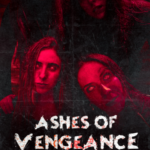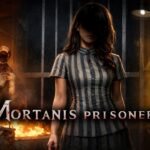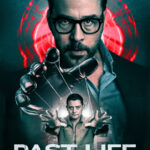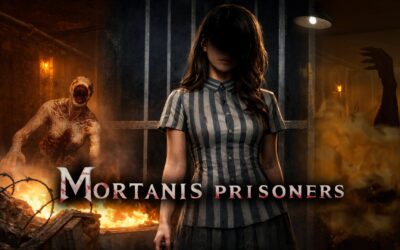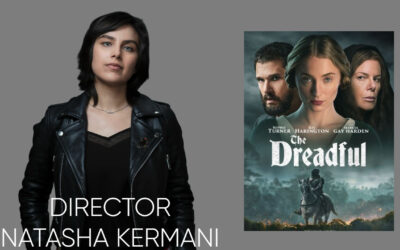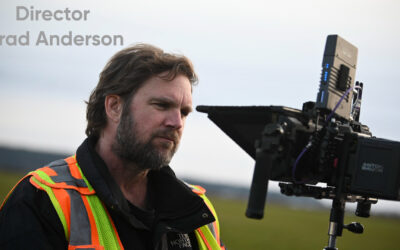
I had the pleasure of speaking with writer-director Larry Brand, who has written many films including Halloween: Resurrection, Paranoia, and The Girl on the Train which he also directed. Brand talked with us about his part of the Holloween franchise as well as one of his most recent projects, the second season of ‘Hollywood & Crime’, titled ‘Young Charlie’. With Charles Manson’s recent passing it is the perfect time to delve into Charles’ life. Brand has incredible insight into Manson’s past and was willing to let me pick his brain about the cult leader who left a path of destruction in his wake.

Horror Fuel: “How did you come to write the Young Charlie series?”
Larry Brand: “My film producing partners Rebecca Reynolds and Jim Carpenter have been producing a podcast series called Hollywood & Crime for Wondery for the last year-and-a-half. It was created it with Jon Ponder and Tracy Pattin, the host of the show. The first season and a half dealt with murders in the 1940s surrounding the Black Dalia. Hernan Lopez, who heads Wondery, was interested in doing a Charles Manson story for the second half of the second season. Rebecca mentioned it to me, but I wanted to find an angle that hasn’t been done before. The name ‘Young Charlie’ just popped into my head, and I thought it might be interesting to trace his life up to the point of the murders.
The series has two lines of narration. Tracy begins the morning the murders are discovered and is entirely from the perspective of the authorities and the public who have no idea what’s going on, and ends with Manson’s arraignment. The other timeline is narrated by Stephen Lang, and begins with Charlie as a five-year-old watching his mother being carted off to jail for an armed robbery. It ends the night he sends his four young killers off to the Sharon Tate-Roman Polanski residence.
What intrigued me was the angle of how young Charlie became “Charles Manson.”
Horror Fuel: “That is interesting. I’ve always been interested in true crime and with Manson dying is a great time to look back at his life. I listened to several episodes of the Young Manson series. I really enjoyed them. I’m going to have to go back and check out the first season of Hollywood & Crime.”
Larry Brand: “The style is somewhat different in the first season of “Hollywood & Crime.” It kind of mimics a 1940s radio broadcast, which fits with that time frame. It has the feel of listening to a broadcast from that period, with dramatizations of the police investigation.
With Young Charlie taking place in the late 1960’s, I wanted to recreate the feeling of that period, so it’s much more like the movies of that era. It’s rich in soundscapes, and the writing itself incorporates 60’s references and 60’s musical lyrics, lines buried from pieces of music that were of the time. I tried to give it a really 60’s feel. I also felt that given the characters were still with us – up until Charlie died a week and a half ago – and we have such a visceral sense of the murders and the aftermath, that it was hard to try and present a recreation that would sound as real as the actual footage. There are recordings from that period, whether it be Polanski or Police Chief Davis. Mainly we simply rely on a narrative that tries to investigate Charlie’s interior – what went on in his mind. I try to and reverse engineer his thought patterns from the behavioral aspects we have access to.”
Horror Fuel: “It really is very interesting. You don’t much get creepier than Manson. He was a bit crazy.”
Larry Brand: “He certainly is not normal, but crazy is a variable and fluid term. He was not insane in the legal sense, which had been defined for over a hundred years by the M’Naghten rule, which basically asks: did he know what he was doing, and did it he know it was wrong? Clearly, Charlie knew what he was doing and clearly he knew it was wrong. Generally, you can figure that out if the assailant tries to cover his tracks or makes excuses. Charlie certainly did not classify as legally insane. There were some indications of schizophrenia during his confinement for the Tate-LaBianca murders. But I don’t really buy that. Charlie had an ability from early on to fake being crazy. This was a huge asset to him in the reformatories. He was a runt, too small to defend himself physically against the bigger kids, some of whom were in for murder. Little Charlie didn’t have much of a chance, so he would go into this crazy act where he would flail his arms, bug his eyes out, and make animal sounds. Nobody wants to fight a crazy person. He might be ‘crazy’ is in the modern, civilized understanding of what that means. But he was not legally insane. I think diagnostically he was clearly a sociopath. But this is not a guy who was listening to God speaking to him. He was not crazy in that sense.”

Horror Fuel: “In your opinion, after doing all of the research, do you think it was a case of nature or nurture that turned him into the man he became?”
Larry Brand: “When I’m not writing movies I tend to do a fair amount of reading, mainly in science and evolutionary biology. I was a psychology major in college. How much is applicable from 1970’s psychology today is questionable, but to me, from several sources, the evidence with sociopathy is that if it’s not inborn it occurs at a very, very young age. An article on the subject of child sociopathy in the June edition of the Atlantic Monthly [‘When your Child is a Psychopath’] says that the symptoms begin to manifest as early as three years old. It does seem to be in the nature of an individual like Charlie Manson, and there is very little ability to change.
Now, there have been some cognitive techniques that have been used to allow budding sociopaths, young sociopaths, to accommodate to conventional social behavior. If they are rewarded for behaviors that most of us intuitively feel are right, they can behave as if they understand right from wrong. But will they will never feel right from wrong? Probably not.
I think Charlie would have been Charlie in any environment. There is a fair amount of evidence that the peer group one finds oneself in has a strong influence on the direction our personalities will take. A sociopath in one peer environment may become a ruthless businessman. Sometimes we’re surprised. Someone can lead a completely normal life and then murder his wife and her friend, like O.J. Simpson. Even if Charlie had achieved success, there is no guarantee that he would not have acted out. But there were so many contingencies that drove events toward the night of August 9, 1969, that had any elements changed – if Charlie had been paroled to the east coast rather than the west coast, had Charlie gone to a military academy, had he not found himself around a group of young people open to suggestion – a lot of these contingencies, had they changed in any respect, would have created another universe where Charlie Manson might have been just a petty con man, or even a successful musician. But even had Charlie been on a different path, he still would have been Charlie. If the opportunities to commit the grotesque crimes he committed had not been available to him, he might have lived and died as a run-of-the-mill criminal.”
Horror Fuel: “So it was a perfect alignment of events that he obtained his role as a cult leader and murder orchestrator?”
Larry Brand: “You should read the article in Atlantic Monthly. There’s a case in there of a guy who had gone through this training and is an adult now. He seemed to succeed for quite a few years. He lived by obeying conventional laws – but he was odd. His ambition, which he fulfilled, was to run a funeral parlor. He still had a fascination with death. I believe the author of the article was flying to California to meet with him, but before she got there he was arrested for assaulting his girlfriend or wife. They had a kid together and he actually used the child as a shield. He was arrested for assaulting her and endangering the child. He seemed to be a success story – then right at the point of this public exposure he reverted. While he didn’t murder anyone, that sociopathic tendency was still there.
The article uses the case of a ten-year-old girl who had already attacked her younger brother, tried to strangle him. These behaviors are already present at the age of three or four. It’s not the most optimistic analysis, but sometimes reality is not what we would hope for.
Horror Fuel: “That is scary. Often the reality of our lives is far from what our parents or ourselves had planned.”
Horror Fuel: “When you looked into the life of Charlie Manson, what did you learn that surprised you the most?”
Larry Brand: “Quite a lot. I knew the layman’s version of the Manson story, knew the outline of the police investigation. I knew more or less the legend of Charlie. Some of it turned out not to be true, it was exaggerated by him. He claimed his mother was a teenage prostitute, but she wasn’t. She was an unwed mother who married a man who gave Charlie his name. He grew up under the hardship of the Depression, but as did many other people. I was surprised and almost amused by his fascination with Dale Carnegie, who had written a book on salesmanship called How to Win Friends and Influence People. By the 50’s. when Charlie was already deeply embedded in the criminal system, he took a course on Dale Carnegie and he really learned those lessons. There was one chapter of the book that stuck out in my mind, where the advice is to ‘let the other fellow believe the idea is his.’ That really rang true with Charlie. Up until he died he claimed he was innocent because he didn’t physically commit the murders – although he did enter the LeBianca murder house and tie up Leno and Rosemary LaBianca, and then told his followers to kill them. But in some way, I think he talked himself into believing that because he hadn’t physically committed the crimes, he somehow wasn’t responsible. He had this astonishing ability to have a conversation and by the end of it, you didn’t know who came up with the idea. Bobby Beausoleil was an associate of the Family, and he had been arrested and was awaiting trial for the murder of Gary Hinman, more or less at Charlie’s request. He said he wouldn’t tell the authorities about Charlie, but Charlie was very nervous about it. The Family had this kind of group meeting where they were discussing what they were going to do – maybe break Bobby out of jail. And Charlie would sit there and he would slowly manipulate the conversation. At some point, someone said, ‘What about a copycat crime?’ Charlie would say, ‘Well, that’s interesting. What about it?’ Then he gently steered the conversation into, ‘Well, what if someone committed this crime, as a similar crime, like the one that put Bobby in jail?’ That’s really the genesis of the Tate murders. By the end of the conversation, if you were sitting in that room, you wouldn’t be able to tell whose idea it was. He really learned and used this technique of manipulating people into believing that it was their idea.
I didn’t realize that he claimed to be a Scientologist. I don’t know if he was ever officially part of the church. It costs hundreds of thousands of dollars to go through the so-called training. He was aware of it through an inmate and he adopted some of the ideas of L. Ron Hubbard. He had this philosophy of peace and love that incorporated some of Scientology’s fantastical elements. He combined philosophies that weren’t particularly sophisticated. His ideas might sound intriguing and somewhat original, but they weren’t. To a naive audience, though, they were quite impressive.
I think what I discovered as I researched the material was that I was no longer surprised by it. By the end of the series, I hope the audience no longer finds Manson as mystifying as they had. The crimes will always be macabre and dark and ultimately evil. He was a sociopath – we get that some people may be born evil. But how he got his followers, some of whom were these everyday middle-class kids, to do his bidding, is hard to fathom. Susan Atkins had had some trouble with the law, but that’s not so with Leslie Van Houten, who was educated. How did he get these kids to do it – that’s really the mystery. I think by the end of the series, we’ll at least have an understanding of how he was able to get into their heads, and how he was able to manipulate them. Was I surprised by what I learned? I guess I was elucidated. I hope to transfer that to the listeners.”
Horror Fuel: “It definitely makes you question things and question how far a person could be manipulated.”
Larry Brand: “True. You’ll find that at different times there were different members of the family. Only a handful went along on the murders. Another few would have known about them. But a lot of them left when they heard talk of violence. Brooks Poston and Paul Watkins left. Kitty Lutesinger, who was Bobby Beausoleil’s girlfriend, left. If you’re looking for a shred of optimism about human nature, not everybody went along with it. Some of them would join and as soon they heard about this dark side they got out. There were some who were clearly susceptible and there were many who were not. Does it speak to human nature? Only in the sense that it speaks to the varieties of human nature, the susceptibility of some, in a sense of brainwashing, on one hand, and people on the other hand who are not susceptible. It only talks to me about the range of the human experience.”
Horror Fuel: “That’s very true and a fascinating subject.”
Horror Fuel: “Are you going to be doing another season of Hollywood & Crime?”
Larry Brand: “There is a discussion underway, I don’t know if I’m at liberty to say what the subject matter is. Rebecca and Jim and Tracy have already started doing research. I’m waiting until there is some kind of official press release on the storyline. But what they have been talking about is a really fascinating case. It’s a Hollywood story and takes place in the 1970’s. I’m looking forward to seeing what happens with it.”
Horror Fuel: ” I have to ask, can you tell us about your experience writing Halloween: Resurrection?”
Larry Brand: “It’s funny, I hadn’t thought about it in a while, but about a week ago I got one of these Google alerts that tells you anytime something is mentioned about you online. I thought it was about Young Charlie and I went to the site and it was about Busta Rhymes and about his five greatest roles. Halloween: Resurrection was number one. I thought, ‘Wow, this is kind of cool. Now I’m going to go down in history as the guy who wrote the best Busta Rhymes role.’
It was an interesting experience, being part of a franchise that has had enormous success and influence over forty years. Working for Dimension, which was a division of Miramax. you don’t get the same creative freedoms. We have our own company called 8180 Films and we’ve done four movies, three of which involved the great Stephen Lang. On Young Charlie, he was kind enough to take time off of making Avatar 2 and 3 to come in and do our voiceover narration. When you’re working for a studio, you basically don’t have the same creative freedom. My feelings about Halloween: Resurrection? The film did very well and was the second most profitable sequel in the franchise. I’m not going to claim that you get the same artistic satisfaction doing that kind of movie as you do a film that is more personal, like one I did twenty years ago called Paranoia, or Christina, which is the first film I did with Lang [also starring Nicki Aycox and Jordan Belfi]. It’s a different experience. I’m happy to be a part of that franchise. It’s a piece of film history. Working with the Weinsteins – let’s just say that I have my own take on their singular charm, purely from the perspective of having worked with that company creatively. When it comes to the other aspects of their personality, I’m hardly surprised by these revelations. The working relationship is not as pleasant as it would be in the indie world. I’ll leave it at that.
I don’t want to convey the impression that I’m down on the movie. It’s just that working for a studio is a different experience. I’ve been in the indie world for the last ten years now, and it’s a lot more artistically rewarding. Working on Halloween was a great introduction to the world of studio franchises. I’m glad I did it.”
Horror Fuel: “I understand.”
Horror Fuel: “Is there a favorite scene from Resurrection?”
Larry Brand: “I do love most of the scenes Busta is in. I met him briefly and found him to be very gracious. I thought his character was terrific in the movie. There is one particularly good scare that Rick Rosenthal pulled off where the camera pans and Michale Myers is standing there. I think it was quite effective. Busta pulled a lot of humor out of it. Bianca [Kajlich] I thought was a really charming and believable heroine. She did a great job.”
Horror Fuel: “I really enjoyed the movie. I’m a big fan of Busta Rhymes, his acting, and his music.”
Larry Brand: “He’s tremendously likable and charming. You should also check out Paranoia. I did it in the late 90’s. It has Larry Drake in it, from Dr. Giggles. They just put it up on Amazon Prime, along with The Coexist Comedy Tour, another 8180 film. I started with genre movies. I did three for Roger Corman. I enjoyed them. With Roger, I had a great deal of freedom. When you make films, you usually have this trade-off: ‘Am I going to make enough to pay the rent for the next ten years and not have a lot of creative freedom, or am I going to make enough to buy the Chic-Fil-A special today and have a great deal of creative freedom?’ I think what a lot of writers do is bounce back and forth. They do a studio movie that will pay their rent and then they can go off and make good little indie pictures. It’s a different psychology and a different part of your creative life. My philosophy is, if you are getting paid to do something that you would do for free, you’re ahead of the game.”
Horror Fuel: “What are you working on now?”
Larry Brand: “Well, I just wrote a script with my buddy Sheldon Lettich, who is known for the Jean-Claude Van Damme movies, including Bloodsport. He also wrote Rambo III. It’s a Revolutionary War piece. I also started a new documentary called New York Apartment. And I’m always looking to do another project with Stephen Lang. We made three movies together and it’s been a great collaboration. Frankly, I’ve spent the past two weeks sleeping. The Young Charlie series was four hours of material. I can’t remember how long it took to write, but it’s like two long movies worth of material. Then we had to cut and record it in a very condensed time frame. It was a lot of work – which is what show business is: you sit around watching Honeymooners reruns for eight months and then all of a sudden you’ve got three projects to get done in two months. It’s just the way it is. I’ve been relaxing a bit.
By the way, I still have to do a rewrite on the final episode of Young Charlie, because when I wrote it he was still alive. We have to change the ending to reference his death, so I’m still working on that.”
Horror Fuel: “When will the next episode air?”
Larry Brand: “It’s an episode a week. They release on Wednesday. This week you’ll have episode five.”
Horror Fuel: “I look forward to hearing it and learning more about Manson.”
Larry Brand: “The show is having a really great response and people seem to enjoy it. It was a lot of fun to write. I’ve never done a podcast before. I tried to make it feel as much like a movie as I could: I call it a movie for the ears. So far the results have been positive.”
Horror Fuel: “It is really good. I’m enjoying it. I look forward to hearing more. I’m going to have to go back and check out the first season too.”
Larry Brand: “It’s good to hear that.”
Horror Fuel: “I’m a big true crime fan. In fact, our site has a whole section dedicated to it.”
Larry Brand: “I believe there is a TV version of Hollywood & Crime in the works. Now, which episodes will include Charlie or the Black Dalia is to be decided. Look out for Hollywood & Crime the TV show.”
Horror Fuel: “That is great news! I have always been interested in true crime.”
Larry Brand: “I plead guilty as well. There are a few shows that I just love, The First 48, Dateline. The reality is that there is this human tendency to lean toward these darker stories on some very primitive level. It’s like somehow this knowledge is related to our ability to survive. The examination of these events may be important to us as members of a complex social species.”
Horror Fuel: “I’ve always tried to understand what goes on in people’s minds, what causes them to do the things that they do.”
Larry Brand: “I think that’s why Charlie has held this lingering interest. The crimes seemed so inexplicable. The initial expectation from the police, which is understandable, was that the Tate killings were because of some kind of drug deal or grudge or some sexual relationship. No one was expecting it to be four hippie kids that looked indistinguishable from the kids of Woodstock. I think that’s why I was interested in it, to find the underlying reason that they did this.”

Larry Brand’s research into Charles Manson’s past, his crimes, and his mind is not only fascinating but important. Looking into Manson may one day help doctors and law enforcement prevent a tragedy or better treat those who are similar to Manson.
Be sure to visit the ‘Hollywood Crime’ to listen to full episodes of the podcast. Tune in every Wednesday for ‘Young Charlie’.
For more on ‘Young Charlie’ visit the Wondery website and follow on Facebook and Twitter. Follow Larry Brand on Twitter for regular updates on his projects and more.



